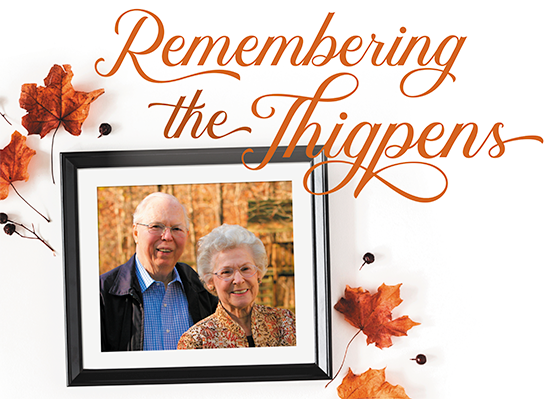
April-May 2021
Bloom
------------------
|





Remembering the Thigpens
By W. Jackson Watts
In 2008, I published the article “Conversations With Charlie” in ONE Magazine. Little did I know those “conversations” would continue for years beyond that article. I was reminded of this in late December when Dr. and Mrs. Thigpen—Charles Allen and “Lolly” to those from the Turbeville, South Carolina, community—went home to be with the Lord. They passed only days apart, appropriately reminiscent of the profound marriage they enjoyed in this life as they served Christ and raised a family.
When I first wrote about the Thigpens, I didn’t know we would go on to enjoy the personal relationship we did. My first, not-so-chance encounter with Dr. Thigpen happened in the student center on the old Welch College campus. He had spoken in chapel that September day about Christian service and the importance of trying to help someone every day. Ironically, later that day I saw the elderly Thigpen carrying hefty boxes of Tennessee promotional material into the student center. I recalled his words in chapel and quickly went to help him. He even gave me a dollar, which I still have. (And, yes, you could still buy something for a dollar in 2003.)
Neither he nor I put the pieces together that day, but he was the “Charles Allen” I had heard so much about during my childhood growing up in his hometown. Moreover,
Dr. Thigpen later learned who I was—the grandson of
J.C. Watts, a well-known farmer in his hometown and a beloved former classmate of his Laura. Sometime later, this connection led to many special conversations in the office Thigpen maintained on the former Welch campus during his years as Tennessee state promotional director.
From these conversations and other independent research, I became more aware of the impact the Thigpens had made on Free Will Baptists. They taught thousands of students. They helped mold the Welch College curriculum, moved the school from a two-year to four-year college, formed the teacher education program, and positioned the school to gain credibility in the larger higher educational scene in Tennessee. I continued to encounter former students who shared personal anecdotes of how the Thigpens helped them, both educationally and personally.
Of course, the Thigpens’ influence reached far beyond the College. Dr. Thigpen was moderator of the National Association for six years and authored Randall House curriculum for many years. If you’ve used Bible Scholar, you’ve read his work. Mrs. Thigpen shaped countless pulpits around the denomination by teaching future pastors in speech class and drama. More than one student had to overcome speaking deficiencies or impediments to have effective ministries. Her guidance made that possible. Together, the Thigpens served multiple churches both early and later in life, whether in full-time or interim capacity.
But their greatest impact certainly can and should be gauged on the personal, individual level. I think of my own personal and spiritual formation that required much “heavy lifting” during my first two and half years in college. While the Thigpens already had retired from that era of ministry, their ministry to me continued. On more than one occasion, they invited me to their beautiful Murphy Road home for a home-cooked meal, conversation, and counsel. More than once, I recall needing their advice about relationships. Once, I even brought a young lady I was dating over for the “Thigpen assessment.” Their input, kindness, and prayers sustained me through some of the bumpiness of those years. And not surprisingly, I have since spoken to many others who indicated the Thigpens were a valued source of advice in this important area of life.
While our communication was a little sporadic in recent years, we remained in touch, often exchanging cards and calls. I still have a voicemail from them saved on my phone, which I simply will not erase. Anything good in my life today is at least partly due to their influence, and I miss them.
In recent months, Free Will Baptists have lost some pillars of the “builder generation,” Leroy Forlines and the Thigpens among them. Not only do we owe these individuals a great debt of appreciation, but this is an important occasion to remember they were human beings. They had faults, quirks, weaknesses, and those are as instructive as their achievements and strengths. If they were still with us, they would remind us of things they may have done differently or sacrifices they would gladly make again.
As we prepare for life after COVID-19, this is an occasion of sober rejoicing. We miss these great men and women of God, but we celebrate the end of their suffering. We acknowledge the big shoes we all have to fill collectively. We should also be sure our denominational history—and their individual histories—guide us as we try to build on the foundation they laid.
About the Writer: W. Jackson Watts has served as pastor of Grace FWB Church in the greater St. Louis area since 2011. He also serves Free Will Baptists at the district, state, and national levels, particularly as a member of the Commission for Theological Integrity.
|
|

